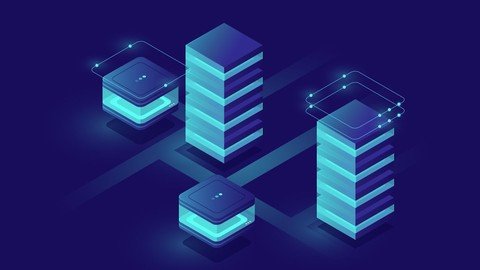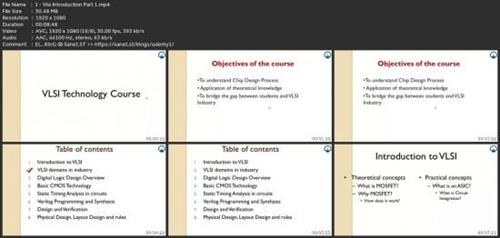
Published 11/2024
MP4 | Video: h264, 1920x1080 | Audio: AAC, 44.1 KHz
Language: English | Size: 2.92 GB | Duration: 7h 54m
Master the fundamentals of VLSI design and dive deep into Verilog programming to bring digital designs to life!
What you'll learn
Fundamental concepts of VLSI and MOSFET operations.
Practical methodologies for VLSI design and chip development.
Digital logic design, including combinational and sequential circuits.
State machine design and sequence detection.
Basics to advanced programming in Verilog.
Real-world applications of hardware description languages (HDLs).
Requirements
Basic understanding of electronics and circuits. Familiarity with digital logic fundamentals is helpful but not mandatory. Enthusiasm to learn and experiment with VLSI design concepts.
Description
Course Introduction:VLSI (Very Large Scale Integration) is at the heart of modern electronics. This course provides an end-to-end understanding of VLSI design concepts, from MOSFET operations to advanced Verilog programming techniques. Whether you're a beginner seeking to understand the basics or a professional looking to expand your skills, this course offers detailed insights into the principles, design methodologies, and practical applications of VLSI systems and Verilog. Step into the world of digital logic design, state machines, and hardware description languages, and prepare to build robust and scalable electronic designs.Section 1: Fundamentals of VLSI and MOSFETsThis section introduces the basics of VLSI design and the operation of NMOS transistors. Students will gain an understanding of the fundamental building blocks of VLSI systems, focusing on how MOSFETs function and their role in electronic circuit design.Section 2: Enhancing MOSFET OperationsDelve into the enhancement mode of MOSFETs and explore their operating characteristics in depth. Learn practical methodologies that govern their behavior and application in real-world scenarios.Section 3: Exploring VLSI Design DomainsDiscover the diverse domains within VLSI, including logic design, analog design, design verification, and physical design. This section also introduces advanced topics such as DFT (Design for Testability), AMS (Analog Mixed Signal), and physical verification processes, ending with a comprehensive overview of chip design steps.Section 4: Fundamentals of Digital Logic DesignThis section covers digital logic design, starting with basic and universal gates, progressing to CMOS logic, combinational and sequential circuits, and concluding with practical examples like the full adder design.Section 5: Advanced Digital Logic DesignBuilding on the basics, this section focuses on sequential circuit components like SR latches and T flip-flops, introduces programmable logic devices, and explores FPGA fundamentals. Students will develop a solid foundation in digital system design.Section 6: State Machines and Sequence DetectorsLearn about state machines, including Moore and Mealy models, and their application in detecting sequences. This section emphasizes real-world use cases to illustrate the utility of finite state machines (FSMs).Section 7: Introduction to Verilog ProgrammingStep into hardware description languages with Verilog. This section introduces Verilog's features, design styles, syntax basics, and the use of identifiers and numeric representations in digital designs.Section 8: Verilog Modules and Data StructuresUnderstand the structure of Verilog modules and explore key concepts like strings, registers, and memory elements. Learn to code practical digital components like D flip-flops and ripple carry counters in Verilog.Section 9: Operators and Timing in VerilogMaster Verilog operators and timing controls, including delay-based and event-based mechanisms. This section includes examples of procedural blocks, conditional statements, and timing intricacies in Verilog designs.Section 10: Advanced Verilog ProgrammingExplore advanced Verilog topics, such as looping statements, blocking and non-blocking assignments, and RTL design examples. This section culminates in a comprehensive wrap-up of Verilog's application in real-world digital systems.Conclusion:This course bridges the gap between theory and practice in VLSI and Verilog programming. By the end, students will have a comprehensive understanding of digital design principles and hands-on experience with Verilog, preparing them to tackle real-world challenges in electronics and embedded systems.
Overview
Section 1: Mosfet Introduction and Nmos Operation
Lecture 1 Vlsi Introduction Part 1
Lecture 2 Vlsi Introduction Part 2
Section 2: Practical Terminology and Methodologies
Lecture 3 Enhancement Mode
Lecture 4 Enhancement Mode and Part 2 Continued Part 1
Lecture 5 Enhancement Mode and Part 2 Continued Part 2
Section 3: Various Domains In Vlsi
Lecture 6 Logic Design and Analog Design
Lecture 7 Design Verification and Physical Design
Lecture 8 Dft, Ams and Physical Verification Part 1
Lecture 9 Dft, Ams and Physical Verification Part 2
Lecture 10 Chip Design Steps
Section 4: Digital Logic Design Overview
Lecture 11 Basic Gates
Lecture 12 Universal Gates, Cmos N and Part 1
Lecture 13 Universal Gates, Cmos N and Part 2
Lecture 14 Nor Cmos Equivalent
Lecture 15 Combinational and Sequential Circuits Full Adder Example Part 1
Lecture 16 Combinational and Sequential Circuits Full Adder Example Part 2
Section 5: Digital Logic Design Overview
Lecture 17 Sr Latch, Tff Down Counter Part 1
Lecture 18 Sr Latch, Tff Down Counter Part 2
Lecture 19 Tff, Programmable Logic Intro Part 1
Lecture 20 Tff, Programmable Logic Intro Part 2
Lecture 21 Pla and Pal
Lecture 22 Fpga Intro and Features Part 1
Lecture 23 Fpga Intro and Features Part 2
Section 6: Digital Logic Design Overview
Lecture 24 State Machine Introduction Part 1
Lecture 25 State Machine Introduction Part 2
Lecture 26 State Machine Example Moore Model Part 1
Lecture 27 State Machine Example Moore Model Part 2
Lecture 28 Fsm To Detect Sequences Examples Part 1
Lecture 29 Fsm To Detect Sequences Examples Part 2
Lecture 30 End Of Digital Logic, Introduction To Verilog
Section 7: Introduction To Verilog Programming
Lecture 31 Verilog Features, Design Styles
Lecture 32 Basics, Identifiers in Verilog
Lecture 33 Numbers in Verilog
Section 8: Strings and Module Structure In Verilog Programming
Lecture 34 Strings, Registers, Data Types Part 1
Lecture 35 Strings, Registers, Data Types Part 2
Lecture 36 Time, Memories, Module Intro
Lecture 37 Module Structure, Dflip Flop Verilog Code Part 1
Lecture 38 Module Structure, Dflip Flop Verilog Code Part 2
Lecture 39 Tflip,Flop, Ripple Carry Counter Part 1
Lecture 40 Tflip,Flop, Ripple Carry Counter Part 2
Section 9: Operators In Verilog Programming
Lecture 41 Basic Gates Instantiation
Lecture 42 Verilog Operators Part 1
Lecture 43 Verilog Operators Part 2
Lecture 44 Operators Contd
Lecture 45 Timing Control In Verilog-Delay Based
Lecture 46 Delay Based Intra-Assign
Section 10: Event Based and Looping Statement In Verilog Programming
Lecture 47 Event Based Timing Control Part 1
Lecture 48 Event Based Timing Control Part 2
Lecture 49 Procedural Blocks In Verilog Part 1
Lecture 50 Procedural Blocks In Verilog Part 2
Lecture 51 Blocking-Non Blocking,Conditional Statements
Lecture 52 Looping Statements and Rtl Example, Conclusion Part 1
Lecture 53 Looping Statements and Rtl Example, Conclusion Part 2
Electronics engineering students exploring VLSI design.,Professionals in semiconductor and embedded systems industries.,Beginners keen to understand hardware description languages like Verilog.,Hobbyists aiming to create scalable and functional digital designs.
Screenshots

Say "Thank You"
rapidgator.net:
https://rapidgator.net/file/dfd29b79c5d8c302304a4c216e15f1b8/fztqn.Vlsi.Design.And.Verilog.Programming.From.Basics.To.Advanced.part1.rar.html
https://rapidgator.net/file/4875d9626bc0186a8e4d799ed102c70d/fztqn.Vlsi.Design.And.Verilog.Programming.From.Basics.To.Advanced.part2.rar.html
https://rapidgator.net/file/2bfe03b2a686e4cd95eb911e4c29a30e/fztqn.Vlsi.Design.And.Verilog.Programming.From.Basics.To.Advanced.part3.rar.html
https://rapidgator.net/file/6e1a6d14712f38e225ce7394da4c1ee2/fztqn.Vlsi.Design.And.Verilog.Programming.From.Basics.To.Advanced.part4.rar.html
k2s.cc:
https://k2s.cc/file/f76a99acce4a8/fztqn.Vlsi.Design.And.Verilog.Programming.From.Basics.To.Advanced.part1.rar
https://k2s.cc/file/ebf8f300fdd40/fztqn.Vlsi.Design.And.Verilog.Programming.From.Basics.To.Advanced.part2.rar
https://k2s.cc/file/072903deb80ce/fztqn.Vlsi.Design.And.Verilog.Programming.From.Basics.To.Advanced.part3.rar
https://k2s.cc/file/a4efdb3d4e9e5/fztqn.Vlsi.Design.And.Verilog.Programming.From.Basics.To.Advanced.part4.rar
